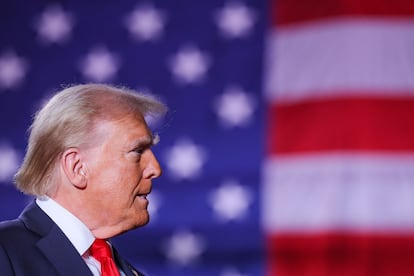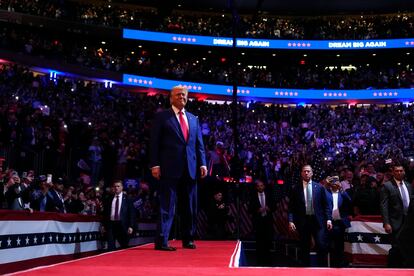Candidate Donald Trump: The resilience of a leader unaffected by discredit or condemnation
The Republican candidate has turned every judicial, business, or media setback and the controversies over racist insults at his rallies into a golden opportunity to raise money and secure votes


Even if he were to succeed and be re-elected, Donald Trump would return to the White House with a thorn in his side. New York, the city he loves, the seat of his empire, the dock where he has been tried and convicted, still sees him as a body, more than strange, extemporaneous. The suspicion was evident after the Republican’s rally last Sunday at Madison Square Garden, with which he intended to put the finishing touch to the campaign. The flow of racist insults from his opening acts —about 30; with Trump everything is large-scale — stole the show and the magnate, who boasts of having contributed to the brilliance of the city that disdains him, was forced to watch how the roar of the controversy silenced his message.
Katherine, a political independent, gave her opinion of him as she left the rally: “Trump has spent his entire life trying to be accepted as a rich, classy guy in New York. He is very angry that he has always been seen as what he really is: a criminal. That is why he insisted on holding a rally here, but he has been burned.” Describing him as a criminal is not an exaggeration, just a definition: Trump is the first former president and presidential candidate to be convicted in court after he was found guilty in May of 34 crimes in the Stormy Daniels case, involving the payment of hush money to the porn star to buy her silence over an extramarital affair.
This is the character who on November 5 could become, once again, the president of the United States. The prototype of the winner of the bonfire of the vanities in the Big Apple in the 1980s and 1990s, the showman who handed out “loser” cards — in his opinion, the worst insult — to contestants on his reality show, The Apprentice, has the support of approximately half the electorate, including many Hispanics, despite the offense caused by the insult to Puerto Rico that made headlines at his rally (delivered by a comedian whom Trump later claimed not to know). The architect of the transformation of the old Republican Party into a movement in his image and likeness knows that since 2016 almost anything he says or does — the insults, the threats, the concoctions — is a free hit.

The justice system has treated him similarly so far, aside for the multimillion-dollar fines imposed in two civil cases: for the harassment and defamation of columnist E. Jean Carroll and for corporate fraud, of which he was convicted in 2023. The Republican candidate has managed to have the sentence in the Stormy Daniels case postponed until after the election. The other two charges against him, for his role in the assault on the Capitol and attempted electoral fraud in Georgia — a third, over the classified Mar-a-Lago papers, was later dismissed by the judge — do not even have a trial date set, nor is it expected that they will if he is re-elected. In retrospect, he also emerged unscathed from two impeachments, the first during his term in office for the so-called Russian plot, and the second fresh out of the White House, in February 2021, for inciting the Capitol insurrection. It seems as if Trump had luck — and a very expensive law firm — on his side.
The ability to turn setbacks into opportunities, like a boomerang, using the ever-effective tool of victimhood, is one of Trump’s characteristics. “If they can do this to me, they can do this to anyone” he said after being convicted in New York. The judicial offensive the former president has faced in recent months would have brought down even the most seasoned politician; but thanks to this personal identification with his voters, it seems to have given Trump a boost, both in donations — the fundraising figures for his campaign shot up after each indictment — and in voting intention.
Trump was born in Queens, New York, in June 1946, to an immigrant family of German origin with the surname Drumpf. He inherited a real estate business from his father and on it he built his empire, the Trump Organization, his springboard to fame, television and, finally, politics.
Despite his openly xenophobic discourse, his first wife, Ivana, was of Czech heritage and his current wife, Melania, of Slovenian origin. His tumultuous private life and his affairs — with Daniels and a former model, Karen McDougal, whose silence he also bought — ran in secret under the protection of an impeccable image forged between the tabloids and the glossy magazines. To the vineyards, golf courses, hotels and residential developments that, among other assets, have formed the core of his empire’s operations, he wanted to add the honorability of knowledge by launching Trump University. But the center was denounced by the city of New York for issuing non-validated degrees. In 2018, when already in the White House, he ended up paying $25 million to the defrauded students. Again the stone in the shoe of New York, the repeated scenario of his rise and fall. And of his resurrection, when everyone considered him a loser.

The vicissitudes of this strange campaign have projected a corrected and enlarged version of Trump: first, because of the simultaneous political activity and the long judicial hearings; second, because to his condition of victim of justice, as he usually presents himself, he has added the halo of survivor of the two assassination attempts perpetrated against him, in July and September. Many of his supporters saw divine intervention in the former president’s salvation.
In 2016, against all odds, he reached the White House surfing the scandal of the dissemination of an audio recording in which he boasted of being able to grope women because he was famous, so it is likely that the Puerto Rico episode at the New York rally will not even dent his campaign. It’s just another notch of the usual Trump, the class bully: during the 2016 campaign he criminalized Mexicans by calling them “bad hombres,” and in the current one he has stated that migrants are “poisoning the blood of America.”
Referring to the string of insults against minorities at the Madison Square Garden rally as a “love-fest” is another drop in a glass of insolence that never quite fills up: there are plenty of examples, but none more serious than calling the Democrats an “internal enemy” against whom he says he is willing to resort to calling in the army. And that dubious joke in which he threatened to be a “dictator on day one” if he returns to the White House.
The threat that the most divisive figure in recent U.S. history will settle personal grievances with those internal enemies from the Oval Office has so alarmed some of his former advisers that they have called him a fascist. His rival, Kamala Harris, has twice agreed, without using the adjective, that this is the ideology that best describes him. Trump’s critics warn that the barriers that kept him in line — advisers and officials who ignored potentially illegal orders, or steered him away from problematic ideas — will be conspicuous by their absence in a second term, as his transition team considers how to blow up the institutions.
The most defining element of Trump’s political career looms over Tuesday’s elections: his refusal to accept defeat in November 2020, his spurious claim that victory was stolen from him, and the incitement of his supporters to take the Capitol by force and frustrate the usually smooth transfer of power in the White House. From that attempted coup d’état — which cost him the removal of his name from several buildings in New York — the specter of chaos is now apparent if the electoral result goes against him. How someone so discredited, who instigated an insurrection and brought a country of which he claims to be a great patriot to the brink of the abyss, enjoys the support of half the electorate will remain not the question, but the million-dollar answer.
Sign up for our weekly newsletter to get more English-language news coverage from EL PAÍS USA Edition
Tu suscripción se está usando en otro dispositivo
¿Quieres añadir otro usuario a tu suscripción?
Si continúas leyendo en este dispositivo, no se podrá leer en el otro.
FlechaTu suscripción se está usando en otro dispositivo y solo puedes acceder a EL PAÍS desde un dispositivo a la vez.
Si quieres compartir tu cuenta, cambia tu suscripción a la modalidad Premium, así podrás añadir otro usuario. Cada uno accederá con su propia cuenta de email, lo que os permitirá personalizar vuestra experiencia en EL PAÍS.
¿Tienes una suscripción de empresa? Accede aquí para contratar más cuentas.
En el caso de no saber quién está usando tu cuenta, te recomendamos cambiar tu contraseña aquí.
Si decides continuar compartiendo tu cuenta, este mensaje se mostrará en tu dispositivo y en el de la otra persona que está usando tu cuenta de forma indefinida, afectando a tu experiencia de lectura. Puedes consultar aquí los términos y condiciones de la suscripción digital.








































